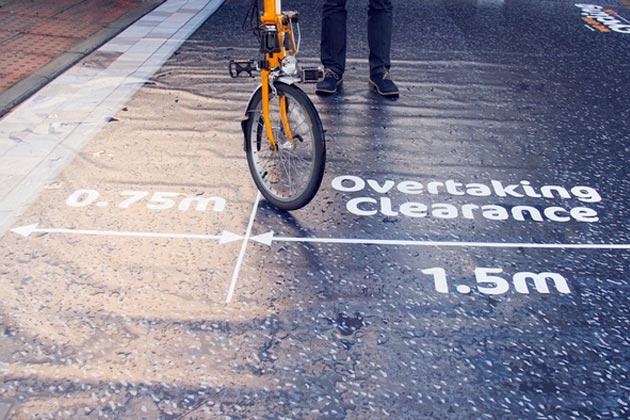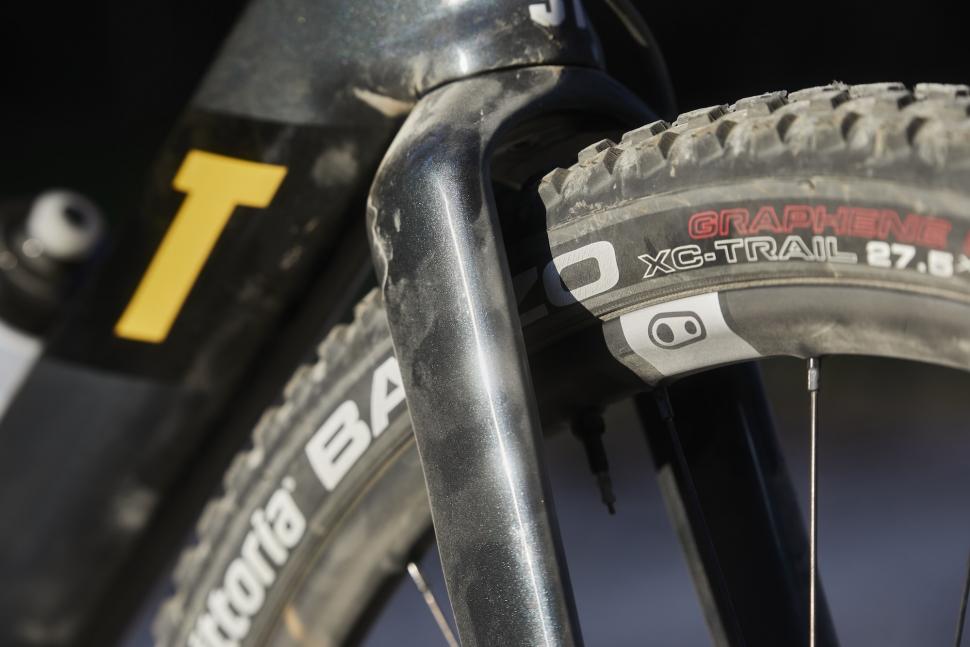- News
- Reviews
- Bikes
- Components
- Bar tape & grips
- Bottom brackets
- Brake & gear cables
- Brake & STI levers
- Brake pads & spares
- Brakes
- Cassettes & freewheels
- Chains
- Chainsets & chainrings
- Derailleurs - front
- Derailleurs - rear
- Forks
- Gear levers & shifters
- Groupsets
- Handlebars & extensions
- Headsets
- Hubs
- Inner tubes
- Pedals
- Quick releases & skewers
- Saddles
- Seatposts
- Stems
- Wheels
- Tyres
- Tubeless valves
- Accessories
- Accessories - misc
- Computer mounts
- Bags
- Bar ends
- Bike bags & cases
- Bottle cages
- Bottles
- Cameras
- Car racks
- Child seats
- Computers
- Glasses
- GPS units
- Helmets
- Lights - front
- Lights - rear
- Lights - sets
- Locks
- Mirrors
- Mudguards
- Racks
- Pumps & CO2 inflators
- Puncture kits
- Reflectives
- Smart watches
- Stands and racks
- Trailers
- Clothing
- Health, fitness and nutrition
- Tools and workshop
- Miscellaneous
- Buyers Guides
- Features
- Forum
- Recommends
- Podcast
news
 podcast episode 50
podcast episode 50Should dealing with third-party camera reports from cyclists be outsourced? Close pass op pioneer Mark Hodson on the road.cc Podcast
To start this episode, the 50th road.cc Podcast, George and Jack sit down for a fascinating discussion with PC Mark Hodson, one of the pioneers behind police close pass operations and a big advocate for third-party reporting from cyclists, drivers and pedestrians alike.
Listen to the road.cc Podcast on Apple Podcasts
Listen to the road.cc Podcast on Spotify
Listen to the road.cc Podcast on Amazon Music
When it comes to reducing harm on the roads and making cycling, walking and motoring safer, nothing is off the table in this discussion. Why are some police forces - even allegedly West Midlands Police who PC Hodson pioneered close pass operations with before moving to motorway policing - lagging behind when it comes to getting bad drivers prosecuted? Is a radical rethink the answer? PC Hodson has some big ideas, so this episode is worth a listen for anyone who is interested in road safety.
> Why does road.cc do Near Miss of the Day?
With many cyclists who contact road.cc with Near Miss of the Day submissions saying their force didn't take action or failed to give feedback, resource is a huge issue in all parts of policing - which is where PC Hodson's radical idea for change comes in.
The answer of how to deal with third-party reporting, says PC Hodson, is to make the process self-managing and provide incentive by recognising it as a great behaviour-changing tool.
"It would only cost £50 million... which isn't a horrific amount of money when RTCs alone cost £40 billion a year," says PC Hodson.
"That creates a system that would be able to deal with any type of demand. You'd have the capacity then to deal with all kinds of offences with effective feedback.
"If you ringfence the fines from third-party reporting and played it back into third-party reporting, it becomes self-managing.
"Do you keep it in public hands or... take it out of the public sector? Do we really want our police officers sitting in an office making these decisions? Can we not do something along the lines of the National Lottery?
"We'll still keep the police perspective on it in that police officers can be seconded... and then you have an extra incentive of 5% going towards road safety charities or people bereaved through road death.
"We just haven't got the political will. It needs someone to step up to the plate and change how this is done. People are starting to lose trust and confidence in the system now, and you don't want that."
What about PC Hodson's advice for reporting camera footage of a close pass, or even a collision?
"Record, retreat, report. Don't get involved with a driver... get the evidence and come away.
> Hit by a driver? The 9 vital steps cyclists should take next
"Always include a minute before and a minute afterwards, so the officer reviewing can see there's nothing that initiated the incident.
"Be honest. In your statement, say how it made you feel, that you felt like you were lucky to make it home. Things like close passes... you've got to show that the driver was inconsiderate.
"Put in your experience of riding or driving. If you've got a driving licence you're an expert witness because you've passed a test to a standard. Put in how it crossed the boundaries of the Highway Code.
"Don't be upset if your submission doesn't quite make the grade. With close passes especially, in court you want that sharp intake from the bench of magistrates."
In part 2, Suvi is joined by the organisers of (hopefully) Finland's next big gravel race to talk about how Europe and the UK can capture some of the magic that has led to such a big gravel riding boom in the US. Once you go gravel you never go back, apparently!
The road.cc Podcast is available on Apple Podcasts, Spotify and Amazon Music, and if you have an Alexa you can just tell it to play the road.cc Podcast. It's also embedded further up the page, so you can just press play.
The road.cc Podcast is 50! To celebrate we're giving away some schwag, so be sure to listen to find out how to enter our special competition and potentially bag some great cycling goodies.
At the time of broadcast, our listeners can also get a free Hammerhead Heart Rate Monitor with the purchase of a Hammerhead Karoo 2. Visit hammerhead.io right now and use promo code ROADCC at checkout to get yours.
Latest Comments
- kcr 2 hours 51 min ago
I think Livingston (no "e") has the best cycling infrastructure I have seen in Scotland. It has an extensive network of paths that are actually...
- kcr 3 hours 31 min ago
I'd say it is an extremely rare condition for most cyclists or runners.
- ErnieC 6 hours 17 min ago
or Team Bahrain ... selective outrage.
- newbankgyratory 7 hours 19 min ago
This website offers suitable data: https://www.automobiledimension.com/large-suv-4x4-cars.php
- newbankgyratory 7 hours 52 min ago
Perhaps park the goods in a US Customs Bonded warehouse and then import them out of there when the tariff nonsense settles down?...
- Dnnnnnn 5 hours 48 min ago
Good to see a road.cc review of what must be one of the UK's best-selling 'proper' road bikes....
- PRSboy 8 hours 47 min ago
Another thing ruined by the Americans
- Miller 10 hours 6 min ago
Nice to see WvA featuring in the finale.
- Miller 10 hours 9 min ago
I have known more than one elder statesman of the club die of a heart failure while out on a ride. Sometimes I feel that's about to happen to me,...
- Pub bike 10 hours 26 min ago
Via the "wireless active steering system".


Add new comment
2 comments
The main advantage of a separate process for road offences based on video evidence is that it takes away the "better things to do with their time" from other members of the public and from the police themselves.
Hodgson clearly makes the cost case on RTCs, but fundamentally we need an attitude change.
I am now strongly of the opinion that the UK is suffering from many interconnected problems which are down to the attitude change that Thatcher brought in with her "no such thing as society" approach. We are living with that legacy. The fundamental issue cyclists are suffering from is that drivers are incensed at the idea that they have any obligation to other road users (and plenty of cyclists show similar attitudes too, to be fair, but the cost of their intolerance is lower).
The other aspect is that there really does need to be a war on cars. If we had invested in public transport since the 1960s instead of the car, we would be moving easily around the country and the cities at low cost. We would not need roads twice the width to allow for private car storage.
However, for public transport to work, you still need an attitude change, where respect for other people is considered a good thing rather than a weakness. And by respect for other people, I mean simple tolerance, no subservience, it has to be mutual, so it is a long term project. GB News is a symptom of how far wrong things have gone in that respect.
I'm sorry but what on earth is a cyclist likely to have done that rationalises someone dangerously overtaking you too closely in a manner that could result in your death or serious injury. Even if you call them every name under the sun and punch their car that shouldn't allow you to use your car as a weapon. This still shows a fundamental lack of understanding that cyclists are massively at risk whenever they are on our roads.